Ginkgo biloba is an herbal supplement that’s used to improve cognitive function and to treat cognitive decline.
It’s an extract of a tree native to China and has a long history in herbal medicine as a treatment for everything from asthma to vertigo.
Today, many supplement enthusiasts take it for its purported cognitive benefits, and it’s even been explored for possible nootropic abilities.
A ginkgo biloba supplement taken at the right dosage might be able to improve your attention for at least six hours.
We’ve taken a look at the options for ginkgo biloba that are on the market right now and come up with the ten best ginkgo biloba supplements. Read on for our rankings.
Research
Rankings
1. Nutricost Ginkgo Biloba
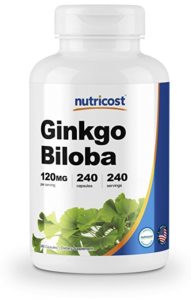
Nutricost Ginkgo Biloba is pure, simple, and effective. With 120 mg of ginkgo biloba plant extract per capsule standardized to contain 24% glycosides, it’s a solid dosage, and its capsule is super-clean.
Just gelatin and rice flour make up the delivery vehicle, making this a great choice for people who care about supplement purity and who want to avoid unnecessary additives.
2. Havasu Nutrition Ginkgo Biloba + Phosphatidylserine
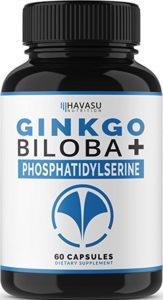
Havasu Nutrition makes a great ginkgo biloba supplement that adds in phosphatidylserine, a lipid molecule that’s often found in soy products that is essential for proper brain function.
The phosphatidylserine should help amplify the effects of ginkgo biloba if you are taking it for cognitive performance, as this compound is also thought to enhance your cognitive performance independently.
It might not be the best option if you are looking to follow clinical protocols for slowing the progression of cognitive decline, but it’s a good bet if you are interested in gingko biloba for its nootropic potential.
3. Life Extension Ginkgo Biloba
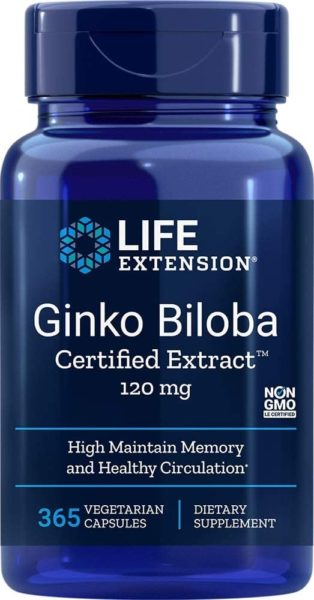
Life Extension Ginkgo Biloba is a pretty standard ginkgo biloba supplement with 120 mg of plant extract, standardized to 24% glycosides and 6% terpene lactones.
It’s one of the best ginkgo biloba supplements that comes in a vegan-friendly capsule, so for those who are strict about their capsule constituents, it’s a good call.
4. Nature’s Bounty Ginkgo Biloba
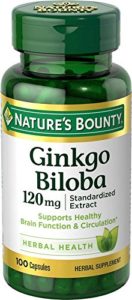
Nature’s Bounty is a reasonably straightforward ginkgo biloba supplement that delivers 120 mg of plant extract, which is standardized to contain 24% glycosides and 6% terpenes.
The capsule is gelatin-based and uses a few ingredients like silica and magnesium stearate as binders and fillers, but aside from that is a pretty clean design.
5. Puritan’s Pride Herbal Sure Ginkgo Biloba
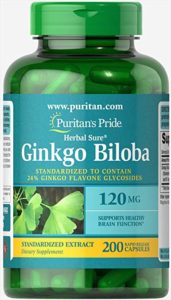
Puritan’s Pride Herbal Sure Ginkgo Biloba is a pretty standard ginkgo biloba supplement that’s got 120 mg of plant extract, standardized to 24% glycosides and 6% terpene lactones.
While the supplement design is not the cleanest around, it will still get the job done—this supplement just doesn’t distinguish itself from the pack, but it’s still a fine choice.
6. Micro Ingredients Superfoods Organic Ginkgo Biloba Powder
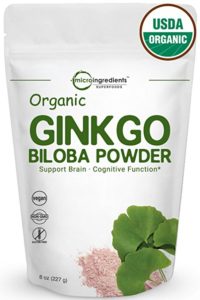
Micro Ingredients Superfoods Organic Ginkgo Biloba Powder has two primary advantages going for it. First, it uses organic ginkgo biloba plant material, which is something that’s pretty rare among its competitors.
Second, it comes in a loose powder form, which gives you a lot more freedom when it comes to dosage and dosing. That being said, this supplement is definitely not for everyone.
Since ginkgo biloba’s recommended dose is fairly small, you’ll want a microscale to properly measure dosage. If that’s not up your alley, opt for a capsule-based ginkgo biloba supplement instead.
7. Green Natr Ginseng + Ginkgo Biloba
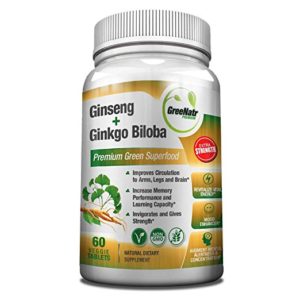
Green Natr Ginseng + Ginkgo Biloba is a very popular combination of ginkgo and ginseng, which is also thought to have cognition-protection effects.
It’s a good fit for people who know they want both herbal ingredients, but it’s not well-suited for following a clinical study protocol, nor is its dosage particularly high.
This supplement contains only 100 mg of raw plant powder and 60 mg of ginkgo biloba extract; that’s half of what you’d get in another more typical supplement.
8. Deal Supplements Ginkgo Biloba
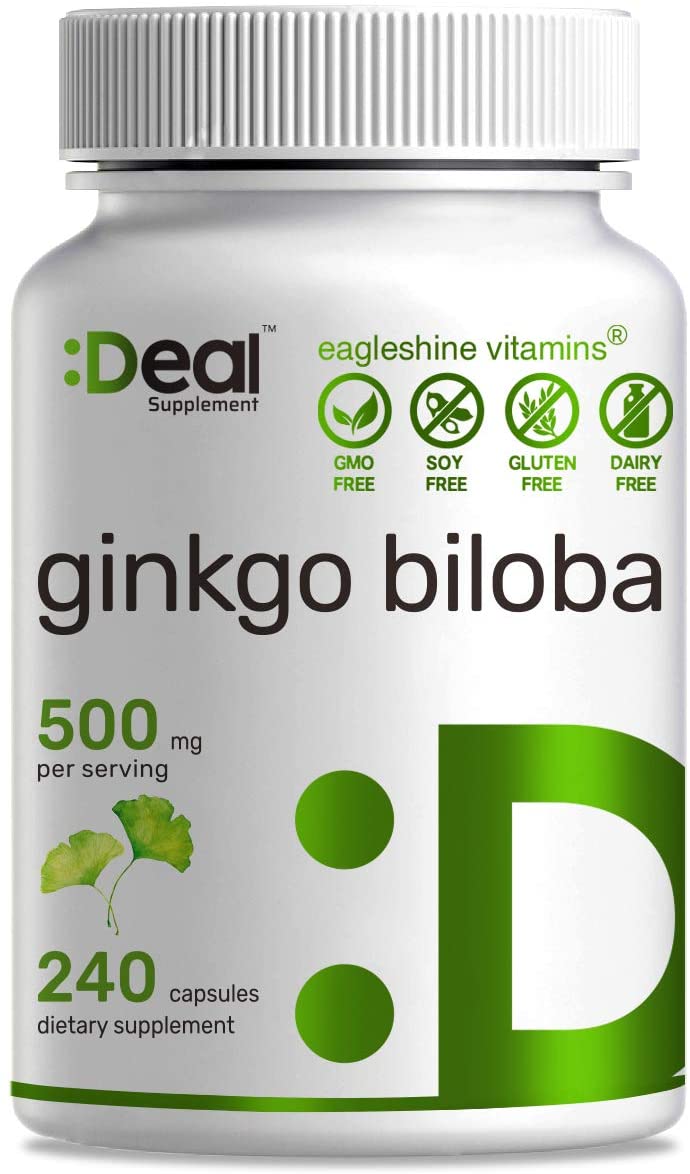
Deal Supplements makes a straight and simple ginkgo biloba supplement that delivers 250 mg of ginkgo per capsule (one “serving” is two capsules). The simplicity is nice, but the major downside is that this supplement does not standardize its ginkgo biloba content to a certain percentage of glycosides like some of the top-rated supplements do.
9. Mason Natural Ginkgo Biloba
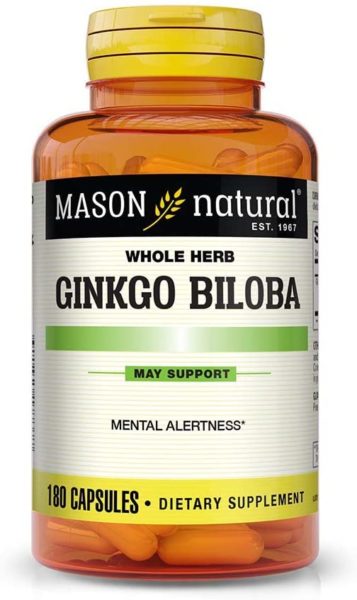
Mason Natural Ginkgo Biloba is a reasonably popular ginkgo biloba supplement that is based on a raw extract of ginkgo biloba leaf, so you know what the equivalent of raw plant material is.
However, this extract is not standardized to any specific glycoside content, which makes it difficult to compare to other similar supplements for active ingredient contents.
10. NooMost Panax Ginseng + Ginkgo Biloba
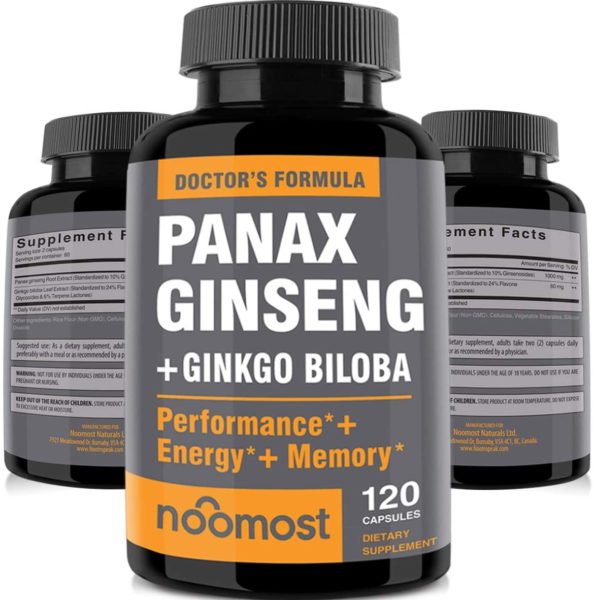
Trunature puts its own spin on the standard ginkgo biloba supplement by adding in five milligrams of vinpocetine, a separate derivative of a different herbal extract that’s been studied in a few small studies.
Vinpocetine doesn’t have nearly as much evidence supporting its inclusion in a supplement for cognitive health, so unless you know you want to take both in combination, a different ginkgo biloba supplement might be better.
Category winners
Best ginkgo biloba overall: Nutricost Ginkgo Biloba
Nutricost Ginkgo Biloba takes our top stop thanks to its ultra-simple formulation and its standardized glycoside content. These precisely-measured capsules mean you know exactly what you’re getting when it comes to the biologically active ingredients in ginkgo biloba.
Best ginkgo biloba for men: Life Extension Ginkgo Biloba
Whether it’s for sexual wellness or cognitive performance, Life Extension Ginkgo Biloba is a great choice for men. The industry-leading dose and high quantity of vegan-friendly capsules make it perfectly suited for men looking to add ginkgo to their daily supplementation regimen.
Best ginkgo biloba for mental wellness: Havasu Nutrition Ginkgo Biloba
Beyond stabilizing or improving cognitive function, many people also find that ginkgo biloba helps improve and stabilize their mood, too. For this purpose, we recommend the dual combo of ginkgo biloba and phosphatidylserine found in Havasu Nutrition Ginkgo Biloba.
Best ginkgo biloba for anxiety: Havasu Nutrition Ginkgo Biloba
For anxiety, we recommend Havasu Nutrition Ginkgo Biloba for the same reasons we recommend this supplement for overall mental wellness and cognitive function—the synergistic effects of ginkgo and phosphatidylserine work to help stabilize and elevate your overall mood.
Best ginkgo biloba for vertigo: Nutricost Ginkgo Biloba
Ginkgo has long been used as a traditional remedy for vertigo, and for this application, it’s hard to argue against the purity and simplicity of Nutricost Ginkgo Biloba. The standardized dose means you’ll get the same effects every time you take it.
Best ginkgo biloba for cognitive function: Havasu Nutrition Ginkgo Biloba
By combining the brain-boosting power of ginkgo biloba with the essential lipids found in phosphatidylserine, Havasu Nutrition makes for an excellent choice if your top priority is preserving or enhancing cognitive function.
Who should buy ginkgo biloba?
Ginkgo biloba is safe for most individuals looking to protect their brain, improve blood flow, and fight off aging. Pregnant women and children should avoid this supplement as it is unstudied in this population.
If you are a diabetic, you should also avoid it as Ginkgo Biloba can affect insulin levels. People who are taking blood pressure medications should speak to their doctor before taking this supplement as it may interfere with their prescription.
If you are planning on having surgery, avoid taking Ginkgo biloba a few weeks prior to surgery as it can affect blood clotting. You should also avoid it for a few weeks post-surgery. Leading off this, people with bleeding disorders should also avoid Ginkgo biloba supplements unless otherwise directed by a doctor.
How we ranked
When ranking the best Gingko Biloba supplements, we first looked at the ingredients. Top-notch Ginkgo Biloba is made from leaf extracts that are standardized to 6% terpene lactones and 24% glycosides. As such, products like Puritan’s Pride and Life Extensions ranked well. Mason Natural did not rank that well because it failed to provide an extract that was standardized to our specific glycoside needs. We also preferred products like Nature’s Bounty, which included no artificial flavors, colors, or sweeteners. All the best products on our list were also certified non-GMO and allergen-free.
Next, we looked at dosing. According to various studies, the clinically effective dosage is 240mg, split into two 120mg doses per day. There is also some research that shows that a single mega dose of 360mg is great for cognitive enhancement. As such, products like TR Supplements ranked well for providing 120mg capsules, that could easily be tailored to an individual’s needs and goals. Micro Ingredients provided a powdered Ginkgo Biloba option, which was inconvenient for accurate dosing. As such, it fell to the bottom half of our rankings.
Lastly, we looked at products that went the extra mile. Havasu Nutrition ranked extremely well for providing phosphatidylserine alongside ginkgo Biloba to amplify the cognitive-enhancing effects. Our top pick, Nutricost, avoids anything unnecessary and is a purist’s dream; providing 120mg of Ginkgo Biloba plant extract standardized at 24% glycosides, without any fillers.
Benefits
Ginkgo biloba has been studied for slowing and preventing cognitive decline in old age. The primary effects of ginkgo biloba are thought to be related to preserving the proper function of your brain as you get older.
One report published in the Journal of the American Medical Association described a year-long study in 300 people with dementia or Alzheimer’s disease, half of whom were treated with a ginkgo biloba supplement and half of whom were treated with a placebo (1).
The researchers used an objective test of cognitive function, and found that the ginkgo biloba supplement was associated with a significant improvement in their cognitive abilities over the course of the year, compared to the placebo group.
The researchers hypothesized that the ginkgo biloba supplement helped reverse some of the damage that had occurred in the brain, helping to increase brain functioning in those who responded to the supplement.
Not all studies have found a benefit to ginkgo biloba. One large randomized clinical trial found contradictory results when it came to actually preventing Alzheimer’s disease and cognitive decline.
This experiment was conducted at the University of Virginia School of Medicine and published in the Journal of the American Medical Association (2).
In it, over 3,000 people aged 75 and older were randomly assigned to either a ginkgo biloba group or a placebo group, and the participants were evaluated every six months for their rate of dementia.
The researchers found that ginkgo biloba did not prevent Alzheimer’s disease, and did not slow the rate of progression for mild cognitive impairment.
Dosage matters when it comes to ginkgo biloba for preventing cognitive decline. Commenting on the findings of some previous work that had found no benefits to ginkgo biloba a scientific article published in 2015 in the Journal of Alzheimer’s Disease by two scientists at the University of Bari Aldo Moro in Italy noted that clinical trials that used dosages lower than 240 mg of standardized ginkgo biloba per day tended to be the ineffective ones (3).
Additionally, the researchers pointed out that newer studies that specifically included patients with Alzheimer’s disease tended to find more of a benefit for ginkgo biloba than those that only looked at mild cognitive impairment.
The dosage appears to be pretty important for ginkgo biloba, at least when it comes to preventing or slowing the most severe types of cognitive decline, like Alzheimer’s disease.
Ginkgo biloba may increase attention. As with many other supplements that have been studied for their ability to treat or prevent cognitive decline (like acetylcholine, for example), there has also been interest in using ginkgo biloba in healthy young people as a way to boost cognitive performance beyond baseline levels.
Its nootropic effects were investigated in a study published in 2000 in the journal Psychopharmacology (4). This study involved giving young, healthy volunteers increasing doses of ginkgo biloba and measuring their cognitive performance.
The dosage ranged from 120 to 360 mg of ginkgo biloba extract. After reviewing the results from the battery of cognitive performance tests, the researchers found that both the 240 mg and the 360 mg resulted in boosts to attention.
These improvements were sustained in both cases for up to six hours, making the case that ginkgo biloba is a nootropic that’s well-suited for marathon study sessions or all-day-long project sessions at work.
For this reason, you’ll often find it blended with other memory-boosting or reaction-speed boosting supplements (like caffeine) in nootropic, cognitive-performance supplements.
Side effects
Ginkgo biloba does not appear to have serious side effects when taken at the recommended dose in large clinical trials; some of the biggest studies have found no group differences in side effects when comparing the placebo group and the ginkgo biloba group.
However, ginkgo biloba does have the potential to cause serious side effects, including seizures, at high doses, and there are medical case studies reporting on drug interactions in people who are taking prescription medication.
These appear to be more common among drugs which modulate your blood’s clotting ability, like warfarin and, more relevant to many older people, aspirin (5).
If you already take aspirin to reduce your risk of heart disease, you should talk to your doctor first before starting a ginkgo biloba supplement.
Recommended dose
As noted earlier, if you are taking ginkgo biloba for preventing or treating cognitive decline, the dosage seems to matter, at least according to one review study.
Strive for a dose of 240 mg every day in this case, likely split into two equal doses of 120 mg of ginkgo biloba; one taken in the morning and one taken in the evening.
For the purposes of boosting cognitive performance, a bolus dose appears to be more effective. A single dose of up to 360 mg has been used to boost attention, and these effects appear to last for at least 6 hours.
FAQ
Can ginkgo biloba help with cognitive decline? Ginkgo biloba is a supplement that’s been intently studied for its ability to protect your brain from cognitive decline and perhaps even to improve its cognitive ability beyond its normal level. It should only be taken at moderate doses, and unlike some other herbal supplements, its benefits appear to be fairly focused—all of the effects of this naturally-occurring extract seem to involve your brain.
What is Ginkgo Biloba? Ginkgo Biloba is a tree that grows predominantly in China and other Asian countries. The extracts from the leaves of this tree are used in herbal supplements, which are effective in improving blood circulation, brain functioning, anxiety, bronchitis, asthma, and several other conditions.
In what forms is Ginkgo Biloba available? The herbal medicine, Ginkgo Biloba, is available in the form of tablets, capsules, tea, and liquid extracts.
Is Ginkgo Biloba safe to use? Yes, it is safe to use Ginkgo Biloba. For centuries, this tree has been used for treating various ailments. Ginkgo is rich in flavonoids and terpenes known for their antioxidant properties. These compounds fight free radicals that may cause harm in the body, citing its safety even further.
However, Ginkgo Biloba can result in interactions with certain drugs or with certain compounds. The common side effects observed are allergic reactions, stomach upset, and headaches in individuals. Always make sure that you stick to the dosage, read the label, and understand what can trigger an allergic reaction while consuming this supplement. We always recommend that you consult with your physician prior to taking any supplements.
What is the ideal dosage of Ginkgo Biloba? There is no standardized dosing for taking Ginkgo Biloba. Many supplement manufacturers claim that it is safe to take Ginkgo in the range of 120-240mg. It is best to start with a low dosage to check if there are any allergic reactions to the supplement. If you are fine with it, then you can gradually increase the dosage.
What is the ideal dosage for anxiety treatment? Ginkgo leaf extract of 80 or 160mg is beneficial for individuals who suffer from anxiety. The extracts have to be taken for a minimum of four weeks thrice in a day for the feasible results to appear.
What is the ideal dosage for dementia and Alzheimer’s? For this condition, various studies have established that a dose in the range of 60-480mg can prove to be effective. However, for significant results to appear, the dose needs to be continued for a year. In various clinical studies, the most commonly used dose of this herbal supplement is 120-240 mg.
What is the ideal dosage for vision problems? 120 mg extract is to be taken for a period of six months by patients suffering from vision-related issues.
What is the ideal dosage for dizziness? 160 mg is the preferred dosage for treating Vertigo. This dosage has to be continued for a period of three months to see effective results.
Is it safe to take Ginkgo Biloba for treating schizophrenia? There is no solid research evidence to back this claim. However, several studies have shown that taking Ginkgo Biloba daily, for a period of eight to sixteen weeks, can lower the symptoms noted in schizophrenia patients.
Does Ginkgo Biloba interact with anticoagulants? Ginkgo Biloba slows down the clotting of blood. Taking it with anticoagulants can increase the chance of bleeding or bruising. Medications such as aspirin, warfarin, naproxen, and ibuprofen should never be taken together with Ginkgo extracts.
Can Ginkgo Biloba supplements be used for treating heart conditions? Ginkgo Biloba extracts are not effective for treating heart ailments. They do not lower the chance of having a heart attack or any other heart-related condition.
Is it safe for a pregnant woman to take Ginkgo Biloba extract? There isn’t enough evidence to establish if it is safe for a pregnant woman to use this herbal medicine or not. Yet, it may result in extra bleeding or induce early labor. Hence, it is best for pregnant and breast-feeding women to avoid consuming Ginkgo Biloba.
Can Ginkgo Biloba supplements be given to children? It is not safe to give Ginkgo Biloba leaf extracts to children. Some research studies claim that a combination of ginseng and ginkgo extracts can prove to be safe when used for a short duration. Moreover, Ginkgo seeds can result in seizures and death in children as they are toxic (6).
Can diabetic people take Ginkgo Biloba extract? Ginkgo Biloba may interact with the medications or the management of the condition.
Is it safe to take Ginkgo Biloba with ibuprofen? No. Ginkgo Biloba can slow down the clotting of blood, which Ibuprofen also does. As such, combining both can prove to be disastrous. It may also increase the chances of bruising in some individuals.
How does Ginkgo Biloba work? The Ginkgo Biloba leaf is rich in terpenes and flavonoids that are natural antioxidants. These lower the damage caused due to free radicals. Primarily, the extract from the leaves can improve blood circulation in the body.
It is an antioxidant and hence, is effective in treating Alzheimer’s disease. The seeds also possess antimicrobial properties, but are toxic and, therefore, must be avoided.
Does Ginkgo Biloba offer instant results? No, Ginkgo biloba doesn’t offer instant results, and often takes several weeks to create noticeable results.
Can Ginkgo Biloba increase blood pressure? Yes, Ginkgo can lower blood pressure. Yet, taking it with medications that you are already taking to control your blood pressure can further lower it, which may cause issues. The same is the case with diabetic individuals. Ginkgo Biloba can increase or lower insulin levels, thereby resulting in an imbalance.
When should I take Ginkgo Biloba? Ginkgo Biloba should be taken an hour before going to bed. In various research studies, it has been established that these supplements can lower stress significantly, and thus improves the quality of sleep. Hence, you would be able to sleep peacefully and start the next day supercharged to take on your day-to-day activities.
Can Ginkgo Biloba cause damage to the liver? Ginkgo Biloba increased the risk of liver cancer while studying the effect on lab animals. However, taking the supplement in moderate dosage and for a short period has no effect on the liver function (7).
Where can I buy Ginkgo Biloba? Generally, you can buy this supplement anywhere where supplements are sold, such as a pharmacy, online stores like Amazon, or at some natural health food and supplement stores.
Is Ginkgo Biloba approved by the FDA? Owing to the lack of substantial research studies done with Ginkgo Biloba extracts, the FDA doesn’t consider it to be safe for use or consider it useful in the prevention of certain ailments.
Does Ginkgo Biloba promote hair growth? Ginkgo Biloba enhances blood circulation, and this may boost the uptake of nutrients. It has been found to be effective in the case of an itchy scalp.
Does Ginkgo Biloba assist in weight loss? Ginkgo Biloba improves circulation of blood throughout the body, and improve performance in athletes. However, there isn’t enough evidence to prove that it can help in burning excess fat deposits in the body. To lose fat, you must establish a healthy lifestyle consisting of a balanced and nutrient-rich diet and regular exercise.
Does Ginkgo Biloba have any expiry date? Ginkgo Biloba is a natural leaf extract and generally doesn’t have an expiry date.
Can Ginkgo Biloba help with depression? Yes, the anti-inflammatory properties of Ginkgo Biloba are believed to fight psychological issues such as depression. Countries such as Germany have accredited this herbal supplement as a source of dealing with depression (8). More research is needed to confirm these findings.
Can I give Ginkgo Biloba to my dog? Yes, Ginkgo Biloba is recommended for dogs with cognitive disorders. This is because it has been proven to be beneficial in stimulating cerebral and peripheral blood flow. However, its potential has not been fully explored when it comes to veterinary science. We recommend discussing your options with your pet’s vet before starting this supplement.
Is Ginkgo Biloba effective for treating skin conditions? Ginkgo Biloba is an antioxidant and increases hydration which can help soothe inflamed skin. It also possesses anti-aging properties and reduce roughness by increasing the retention of moisture in the skin.
Can Ginkgo Biloba cause cancer? There has been some evidence showing that Ginkgo Biloba may cause cancer in lab animals. However, this hasn’t been shown in human studies, and further research should be conducted to verify or deny these claims.
When should I take Ginkgo Biloba? You can take Ginkgo Biloba at any time of the day. Generally, it is recommended to stay consistent and take the same dosage each day. Some individuals may recommend taking it 30-60 minutes before bed since this can help you ease into a restful sleep.
Is Ginkgo biloba safe to take daily? Yes, Ginkgo Biloba is safe to take daily. The most popular dose for dementia is three 40mg doses daily. In terms of a nootropic use, you can use up to 600mg per day.
Who should not take Ginkgo Biloba? Pregnant women and children should not consume Ginkgo Biloba, as there may be unknown side effects. Persons who are about to undergo surgery should stop taking it at least 2-3 weeks before. They should also not take it again until about a month after. People with bleeding disorders should never take Ginkgo Biloba.
Diabetics should avoid it as it can cause insulin fluctuations, which will make managing diabetes harder than it already is. People who are on blood pressure-lowering medications should also avoid it as Ginkgo Biloba can have a negative interactions with these medications.
Related Articles
Recap
Ginkgo biloba is an herbal extract that’s been studied as a treatment or a preventative agent for cognitive decline, dementia, and Alzheimer’s disease.
Its efficacy for treating and preventing these conditions is controversial, but if it is effective, its efficacy is likely optimized at doses of 240 mg per day, divided into two doses.
Interest in ginkgo biloba as a cognition-protecting agent has also sparked interest in the ability to use it as a nootropic, and some evidence that looks pretty promising has shown that it can be taken at higher single doses of 240 to 360 mg to improve your ability to concentrate.
It’s a pretty well-tolerated supplement, as long as you stay within the recommended dosage ranges and you don’t take it alongside any prescription medications without asking your doctor first, especially if your medications involve compounds that affect the clotting ability of your blood, like aspirin or warfarin.
In all, ginkgo biloba shows considerable promise when it comes to preserving your brain’s cognitive function as you get older, and even boosting its cognitive and attentive abilities beyond its normal level.
For BodyNutrition’s #1 recommended ginkgo biloba supplement, click here.